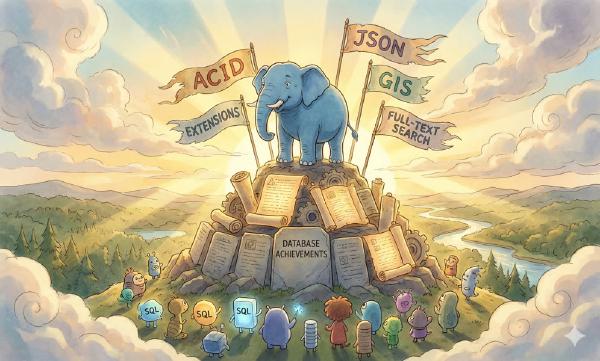Today, the famous database popularity ranking DB-Engine announced the 2024 Database of the Year. PostgreSQL has won this honor for the fifth time. Of course, PostgreSQL was also the Database of the Year in 2023, 2019, 2018, and 2017. If Snowflake hadn’t stolen the spotlight in 2020 and 2021, finishing second, it would have been seven consecutive years of total dominance.
PostgreSQL Crowned 2024 “Database Management System of the Year”#
DB-Engines officially announced today that PostgreSQL has once again been crowned “DBMS of the Year” — this is its second consecutive year winning this honor, and the fifth time it has topped the rankings after dominating in 2017, 2018, 2019, and 2023. The runner-up goes to the aggressively rising Snowflake, while third place belongs to Microsoft. Over the past year, PostgreSQL has become the most popular database management system, surpassing all other 423 databases monitored by DB-Engine.
Let’s rewind to nearly 35 years ago, when “Postgres” first made its debut. Since then, to keep pace with database technology trends, PostgreSQL has continuously evolved, becoming increasingly powerful while maintaining unwavering stability. PostgreSQL 17, launched in September 2024, brought new optimizations and feature extensions in performance and replication, pushing this “evergreen tree” to new heights. Looking at today’s open-source community, PostgreSQL can be called a model that combines both popularity and strength, with enduring prosperity.
What’s most interesting is that according to DB-Engine’s popularity ranking score increases this year, Snowflake gained 28 points while PostgreSQL gained 14.5 points. By their Database of the Year calculation rules (January 2025 - January 2024 popularity scores), “Snowflake” should have won “Database of the Year,” but the editors still chose PostgreSQL as the Database of the Year.
Of course, I don’t think DB-Engine’s editors would make such a foolish elementary math error. Honestly, given PostgreSQL’s amazing growth and impressive performance in 2024, if they hadn’t named PostgreSQL as Database of the Year, the only ones losing credibility and face would be the ranking itself (just like if Breath of the Wild and The Witcher 3 weren’t considered Game of the Year, the only ones embarrassed would be the gaming media). So I guess the editors had no choice but to stubbornly crown PostgreSQL No.1 against their own data.
Honestly, compared to StackOverflow’s Annual Global Developer Survey with first-hand large sample surveys, DB-Engine’s popularity rankings can only serve as a rough reference — given its unified standards, it has good reference value for studying databases’ popularity changes relative to their own historical trends (longitudinal comparability), but its reference value for horizontal comparisons of different databases’ popularity (cross-sectional comparability) is significantly diminished.
DB-Engine Blog Original Text#
PostgreSQL Crowned 2024 “Database Management System of the Year”
Author: Tom Russell, January 13, 2025
https://db-engines.com/en/blog_post/109
DB-Engines officially announced today that PostgreSQL has once again been crowned “DBMS of the Year” — this is its second consecutive year winning this honor, and the fifth time it has topped the rankings after dominating in 2017, 2018, 2019, and 2023. The runner-up goes to the aggressively rising Snowflake, while third place belongs to Microsoft. Over the past year, PostgreSQL has become the most popular database management system, surpassing all other 423 databases monitored by DB-Engine.
Let’s rewind to nearly 35 years ago, when “Postgres” first made its debut. Since then, to keep pace with database technology trends, PostgreSQL has continuously evolved, becoming increasingly powerful while maintaining unwavering stability. PostgreSQL 17, launched in September 2024, brought new optimizations and feature extensions in performance and replication, pushing this “evergreen tree” to new heights. Looking at today’s open-source community, PostgreSQL can be called a model that combines both popularity and strength, with enduring prosperity.
Snowflake, which also performed impressively this year, is more than just a “snowflake” — it’s a cloud-based data warehouse service that attracts many followers with its unique architecture separating storage and compute, plus multi-cloud environment support and data sharing capabilities, making it a highly sought-after rising star in the industry. Snowflake’s ranking surge fully demonstrates its growing influence in the industry.
Third-place Microsoft remains a veteran in the database field: Azure SQL Database provides fully managed relational database services with AI-driven performance optimization and elastic scaling; SQL Server, with its hybrid cloud capabilities, bridges local and cloud environments. Microsoft’s continued innovation in the database space, combined with its comprehensive data services ecosystem, demonstrates formidable strength.








